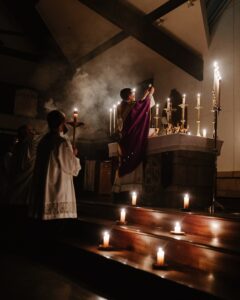My tween daughter recently asked me about people who attend church only at Christmas and Easter. She said that she likes going to church, but that if she ever quit, she couldn’t imagine still attending on these major holidays. At least in my experience, this is a common feeling among Mormons. I mean that I haven’t noticed ward members attending on or around Christmas and Easter who don’t also attend pretty regularly the rest of the year. Part of the reason, I think, is that the LDS Church is such a high-demand church. It’s definitely designed for, and expects members to be, either all in or all out. There’s not much room for people who are kinda sorta in, for whatever reason or at whatever level of activity.

But maybe a bigger reason is that we don’t as a church really do anything special for Christmas or Easter. I was thinking about this recently because there was extra discussion of even Palm Sunday and Holy Week at General Conference. And there was the First Presidency letter that canceled the second hour of church on Easter. At least in my area, there was also supposed to be some effort to invite non-Mormons to come, and to make sacrament meeting nicer than usual. This might have been passed down from the Area Presidency or someone; I couldn’t find a church-wide reference to it.
My ward did have a nice Easter sacrament meeting, with several musical numbers and some good talks focused on Jesus. But it struck me that it was still just a sacrament meeting, built out of the same usual building blocks of talks and singing and prayers and sacrament. Making a special effort at Easter (or Christmas) to make those building blocks better doesn’t change the fact that it’s still the same type of meeting. Other than the sacrament, which is of course the same every week, there isn’t any ceremony or ritual. Other than sacrament and singing (and the odd sustaining vote), there isn’t congregation participation. I think it’s telling even that we call it a meeting rather than a worship service or something like that that lots of other Christians would expect. It makes it sound very businesslike, which I think fits because we’re a pretty businesslike church.